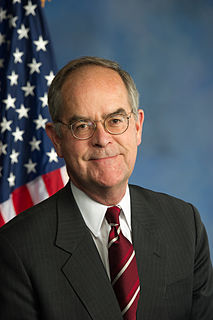A Quote by Tim Kaine
The president doesn't get a line-item veto, so all the budgetary approps stuff is with Congress.
Related Quotes
I do not agree with the use of 'signing statements' to effectively act as a line-item veto, except when the President believes a law or a provision within a law is unconstitutional.In general, if a President signs a law, they are committing themselves to enforcing it. If they don't believe it should become a law, they should veto it.
The veto is a President's Constitutional right, given to him by the drafters of the Constitution because they wanted it as a checkagainst irresponsible Congressional action. The veto forces Congress to take another look at legislation that has been passed. I think this is a responsible tool for a president of the United States, and I have sought to use it responsibly.
Normally what happens in a new presidency is the president has a big agenda, and Congress is full of people with human weaknesses. And so the president indulges the human weaknesses of members of Congress in order to pass his agenda. This time it's the other way around. Donald Trump does not have much of an agenda. Congress burns with this intense Republican agenda and so does Congress that has to put up with the human weaknesses of the president in order to get a signature on the things it desperately wants to pass.
The president is eager to get to work and looks forward to working with the new Congress on policies that will make sure middle-class Americans are sharing in the economic recovery, but the president is clear that he will not let this Congress undo important protections gained -- particularly in areas of health care, Wall Street reform and the environment.
Our president delivered his State of the Union message to Congress. That is one of the things his contract calls for -- to tell congress the condition of the country. This message, as I say, is to Congress. The rest of the people know the condition of the country, for they live in it, but Congress has no idea what is going on in America, so the president has to tell 'em.
We thank those Senators, both Republican and Democrat, who stood firm against tremendous pressure from the Bush administration, pro-drilling members of Congress and their allies in the oil industry. They recognize that the budget is an inappropriate place to decide controversial national policy matters like America's energy policy. We urge all members of Congress to remain steadfast in their belief that the vast, unspoiled wilderness of America?s Arctic National Wildlife Refuge is more than a line item in the Federal Budget.

































